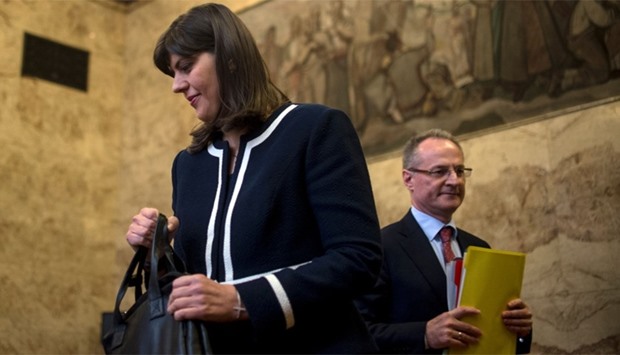Top Bulgarian judge Lozan Panov cuts a lonely figure in the crusade against the rampant corruption gripping his country, the European Union's poorest member state.
Pointing to neighbouring Romania, which saw huge anti-graft protests erupt last month, Panov deplored the ‘lack of courage’ among his fellow countrymen.
‘We're in the same boat as Romania but they have rowers and we don't,’ said Panov, who heads the Supreme Court of Cassation, Bulgaria's highest court for criminal and civil cases.
Panov is one of the only senior judges to openly accuse magistrates of political interference and to campaign for reforms in a system governed by greed rather than justice.
His uphill battle is unlikely to get fresh impetus from Sunday's snap election, the third in four years.
Although the major parties -- spearheaded by the Socialists and the conservative GERB party of ex-prime minister Boyko Borisov -- have all campaigned against embezzlement of public funds, few voters believe that whoever wins the election will make good on their promises.
A new anti-corruption party, launched by ex-justice minister Hristo Ivanov to ‘conquer the state back from the mafia’, is not expected to even pass the four-percent threshold to enter parliament in the March 26 ballot.
‘Bulgarian citizens are disappointed with the functioning of institutions,’ said Transparency International in a statement ahead of the vote.
‘Persistent unaddressed problems include dirty money in politics, unregulated lobbying, a lack of uniform anti-corruption policies in public institutions and non-transparent appointments to key public offices,’ the campaign group noted last month.
- 'Witch hunt' -
Since joining the bloc in 2007, both Bulgaria and Romania have been subject to a special EU monitoring mechanism overseeing their anti-corruption strategies.
But while the EU praised Bucharest's progress in its latest report in January, Sofia remains bottom of the class when it comes to combatting graft, particularly in senior ranks.
Judicial reforms demanded by the EU fizzled in 2015 when lawmakers pushed through a massively watered-down version, prompting Ivanov to resign in protest and launch his new party.
Bulgaria has also failed to follow in the footsteps of Romania, which now has one of the EU's most powerful anti-corruption agencies, the DNA.
The body has brought hundreds of ministers, senators, lawmakers and other public officials to justice in recent years.
But when DNA head Laura Kovesi -- nicknamed ‘Mrs Justice’ in Romania -- recently visited Sofia, many senior magistrates refused to meet her, much to judge Panov's despair.
‘They will have us believe that there's a witch-hunt going on Romania. But while guilty politicians end up in jail in Romania, they're inevitably acquitted in Bulgaria,’ Panov said.
- Oligarchs in charge -
Bulgaria's complex web of corruption and grinding poverty can be traced back to the early 1990s.
When communism collapsed in 1989, Bulgarians' dreams of a better life were soon crushed when the country's wealth and power became concentrated in the hands of oligarchs.
And although the EU accession helped boost the economy, it also exacerbated corrupt practices, with public funds flowing into the pockets of shady businessmen and bent officials.
Oligarchy has ‘captured all key public institutions’, according to the Centre for the Study of Democracy (CDS), a Sofia-based think tank. ‘Corruption controls the government.’
This ‘privatisation of governance’ has affected all major sectors including state administration, healthcare, education and the media, the CDS said in a report released last July.
One in five Bulgarians admitted to paying a bribe last year -- the highest figure in 15 years.
Corruption has also acted as a deterrent to foreign investment.
Between 2007 and 2015, a majority of all public tenders were awarded to just 10 percent of the contenders, the independent Institute for Market Economics in Sofia found.
‘Bulgaria is a post-soviet model of oligarchy which has taken over the country's resources, coupled with a pitiless media propaganda machine,’ said journalist Atanas Tchobanov who runs the investigative news website Bivol.bg.
Nonetheless, he says a glimmer of hope remains.
Back in 2013, tens of thousands of Bulgarians took to the streets to protest against poverty and corruption. The crisis led to the collapse of two consecutive governments.
There's still ‘a sense of this revolt’ left in the population, Tchobanov believes, even if ‘massive resistance to change remains’.

